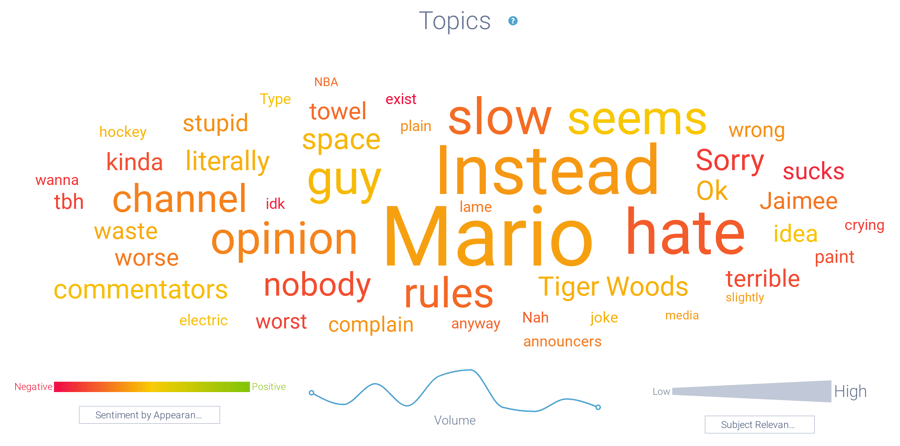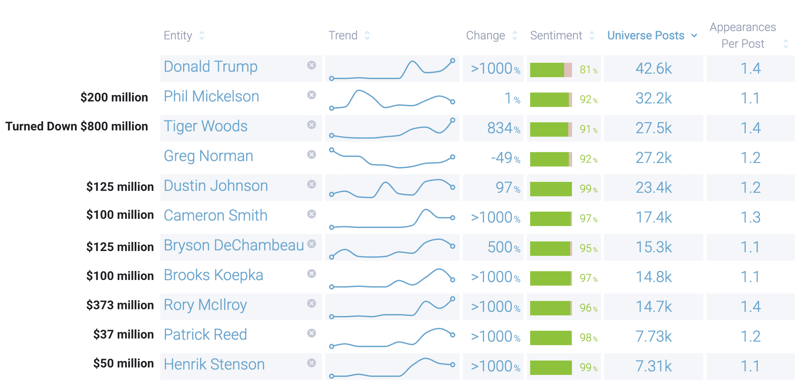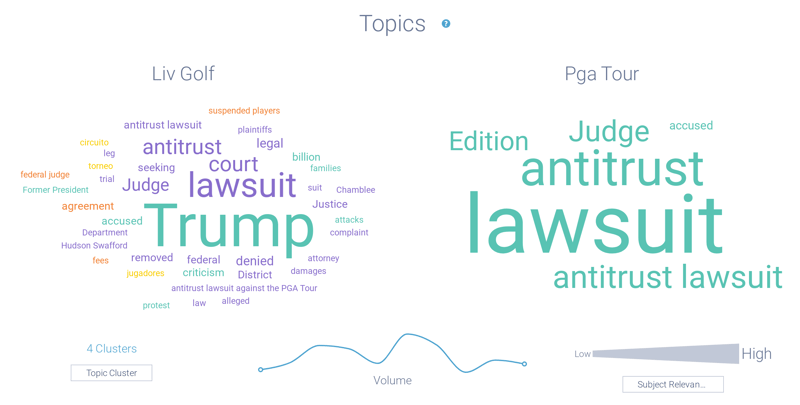Share this
LIV Golf vs. PGA: A New Era in Professional Golf
by Henry Chapman on March 20, 2023
Using social media intelligence to monitor a challenge to legacy golf
LIV Golf, a new golf league backed by Saudi Arabia, has recently entered the professional golf scene and is posing a major challenge to the established PGA. Social listening data can help us comprehend the circumstances surrounding LIV Golf's emergence and its impact on the sport.
Golf has been a popular sport in the United States since the 1700s. It gained widespread popularity in the 1920s with the rise of the PGA Tour. However, over the past 20 years, golf's popularity has declined. According to the National Recreation and Park Association, there was a 22% decrease in golfers from 2003 to 2018. This decline is also reflected in the decline of professional golf's online presence: we have recorded a 15% drop in PGA post volume over the last 15 years.
LIV Golf's emergence heralds competition for PGA golf, but also offers the potential to revitalize the sport. Here, we look at online conversations from golf fans to outline golf’s existing problems, explain why the Saudi Arabian government has involved itself in US golf, and examine PGA’s response.

Figure 1: Relative posts about golf and the PGA Tour from 2007 through the present; Infegy Atlas data.
LIV Golf emerges to fill a gap
The PGA has not made significant changes to the format of professional golf in the last hundred years. LIV Golf offers three key differences compared to the PGA. First, LIV golfers compete in teams, similar to other professional sports, while PGA golf focuses on individual players. Second, LIV Golf has three rounds instead of the PGA's traditional four. Finally, LIV Golf utilizes "shotgun starts" which allow all golfers to start at the same time on different tees, making the game start faster. These last two changes address the main criticism directed at professional golf, which is its slow pace. Commentary from viewers refers to the slow pace of PGA golf frequently and with negative connotations, as can be seen in the top negative topics cloud below.

Figure 2: Negative topics related to the game of golf; Infegy Atlas data.
How has LIV Golf performed?
LIV Golf received a surge in social media posts after its debut, surpassing even the established PGA Tour. The high level of engagement for the new league was sustained throughout the golf off-season, making it a standout in the sport. While both the PGA Tour and LIV Golf received positive reactions from golf fans, LIV Golf received more passionate reactions (47 vs. 29 for the PGA Tour), indicating that it’s injecting fresh excitement, attention, and funding into the sport.

Figure 3: Post volume of PGA Tour vs. LIV Golf; Infegy Atlas data.

Figure 3b: Sentiment of PGA Tour vs. LIV Golf; Infegy Atlas data.
Why Saudi Arabia?
Much of this post volume is from Middle Eastern countries like Saudi Arabia, Iraq, Lebanon, and Kuwait. This is due to the fact that LIV Golf is sponsored by an investment fund backed by the Kingdom of Saudi Arabia. Many journalists and sports commentators believe that this investment in golf is an attempt by Saudi Arabia to "sportswash" controversial actions taken by its current leader, Mohammed Bin Salman. The most controversial action taken by Bin Salman was ordering the state-sponsored murder of Washington Post journalist and US resident, Jamal Khashoggi. #JamalKhashoggi features prominently amongst LIV Golf-related hashtags.
Additionally, this investment in LIV Golf is part of Saudi Arabia's larger strategy to diversify its revenue sources away from its traditional petroleum-export-based economy (Saudi Arabia has been investing in art, museums, and entertainment to promote itself as a cultural center).

Figure 4: Hashtags associated most closely with LIV Golf; Infegy Atlas data.

Figure 4b: Geographic concentration of LIV golf posts vs. PGA tour posts, Infegy Atlas data.
LIV Golf injects billions of dollars into the game
LIV Golf has caused a huge controversy due to the large amounts of money invested by the Saudi government. To attract top golfers, LIV Golf offered high salaries in an attempt to poach PGA tour members, including a reported $800 million to Tiger Woods (who declined). We used data from Infegy Atlas Entities to identify the top 10 golfers associated with LIV Golf and their contracts, which totaled over $1.1 billion. The PGA has responded by banning golfers who took LIV money from participating in PGA events. This division has caused a great split in the golf world.

Figure 5: Top Golf-related people entities related to LIV Golf; Infegy Atlas data.
PGA faces DOJ investigation and lawsuit
The PGA is dealing with controversies of their own. The United States Department of Justice is reportedly investigating the PGA Tour for antitrust violations after the PGA suspended players for playing for LIV Golf. This antitrust lawsuit has the potential to cause great reputational damage and financial cost to the storied golf league. These investigations and lawsuits against the PGA have the potential to quell LIV Golf’s loudest critics, and consequently, strengthen the rival golf league.

Figure 6: Negative topics related to the PGA Tour; Infegy Atlas data.
Takeaways and Key Ideas
Problems associated with traditional legacy golf made it ripe for disruption. Consequently, LIV Golf’s new rules appealed to an audience yearning for a more modern golf game.
Despite this modernization and emergent popularity, LIV Golf has its fair share of criticisms: its sponsorship by a nation that does not respect human rights, and the questionable use of large amounts of money to attract talent remain the two largest criticisms.
The PGA responded with potentially unethical anti-competitive behavior, which has prompted investigations by the US Department of Justice.
With LIV Golf having the financial backing of the Saudi government, we expect them to remain a player in professional golf for the foreseeable future.
LIV Golf Challenges Traditional Golf with Fresh Formats
LIV Golf, backed by Saudi Arabia, introduces revolutionary formats like team play, shorter rounds, and shotgun starts, posing serious challenges to the PGA's long-established practices.
LIV Golf Sparks Excitement and Social Media Buzz
LIV Golf has generated remarkable social media engagement and passionate responses from fans, outpacing the established PGA Tour and injecting fresh excitement into the sport.
Saudi Arabia's Strategic Involvement in Golf
LIV Golf is part of Saudi Arabia's strategy to diversify its economy and counteract negative global perceptions, despite facing controversy over human rights issues and "sportswashing" accusations.
LIV Golf's Impact on Players and Finances
LIV Golf disrupts the golf world with significant financial backing, offering massive contracts to top players, creating a rift between LIV and PGA events, and leading to player suspensions by the PGA.
PGA Under Scrutiny Amid LIV Golf's Rise
The PGA faces Department of Justice investigations for potential antitrust violations, highlighting internal controversies and intensifying the competitive tensions with LIV Golf.
Share this
- December 2025 (2)
- November 2025 (2)
- October 2025 (3)
- September 2025 (2)
- August 2025 (2)
- July 2025 (3)
- June 2025 (3)
- May 2025 (4)
- April 2025 (2)
- March 2025 (1)
- February 2025 (4)
- January 2025 (1)
- December 2024 (2)
- November 2024 (2)
- October 2024 (4)
- September 2024 (2)
- August 2024 (2)
- July 2024 (2)
- June 2024 (2)
- May 2024 (2)
- April 2024 (2)
- March 2024 (2)
- February 2024 (2)
- January 2024 (2)
- December 2023 (3)
- November 2023 (3)
- October 2023 (4)
- September 2023 (4)
- August 2023 (4)
- July 2023 (4)
- June 2023 (3)
- May 2023 (5)
- April 2023 (3)
- March 2023 (7)
- February 2023 (3)
- January 2023 (4)
- December 2022 (2)
- November 2022 (3)
- October 2022 (4)
- September 2022 (2)
- August 2022 (3)




.png?width=64&height=64&name=linkedin%20(1).png)